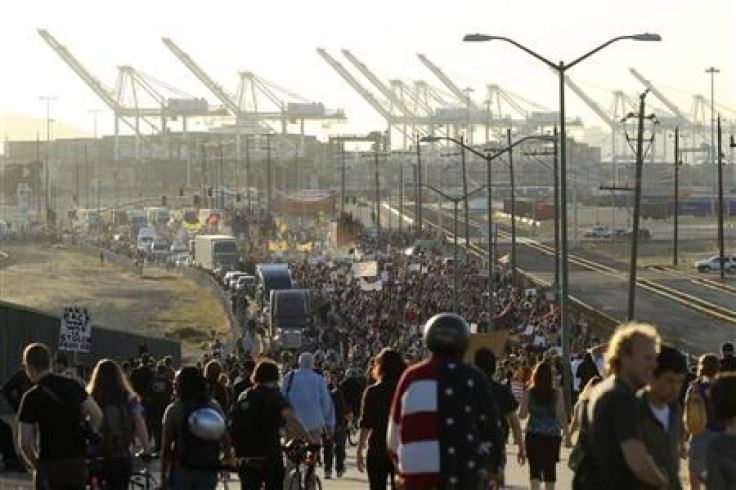Oakland Mayor to Occupy Protesters: 'Leave Immediately'

Recent polls suggest a majority of Americas agree with the Occupy protests, but the City of Oakland in California has had enough.
Oakland mayor, Jean Quan, released a statement Wednesday requesting the occupiers show support for the Oakland people and effectively leave immediately.
Quan, who has throughout her city's Occupation been empathetic with the movement, is calling for Oakland's city council, police and other community leaders to find a way to peacefully remove the encampment from City Hall.
Occupation is a tactic, not a solution, Quan said, who has expressed concern the protest is adversely affecting business in the city.
It's a concern that the city's chamber of commerce reported Oklanders share on Thursday. The chamber's report which stated out of 1,100 people polled 63 percent of them think the protest has had a negative influence on local businesses.
Oakland, which is struggling with stagnant revenues, increasing expenditures and sliding property taxes, also faces a roughly $134 million budget hole in the next two fiscal cycles adding to the already $170 million in shortfalls the city has had to contend with.
And the Occupy protesters have not helped. With reports of vandalism, arson and the closure of the city's port, the fifth busiest in the nation, city and community officials contend the movement is doing more harm than good.
Rick Ohlrich, director of Alameda County Small Business Development Center, said certain small businesses in the direct vicinity of the Occupy encampment, are losing, and have lost business. He stresses though, the protests could negatively effect the city in ways far greater than the immediate dollar amounts lost from the protests.
Ohlrich said he is worried the protest will negatively stigmatize the city, prompting potential business interests to pursue opportunities elsewhere long after the protests fade away.
But Oakland Chamber of Commerce officials say that is already happening.
Isaac Kos-Read, director of external affairs with the Port of Oakland, said cargo holders and port business partners are requesting assurances the port won't be closed in the future or else they will consider rerouting their shipments away from the city.
Paul Junge, the chamber's public policy director, said three companies have rescinded their plans to move into at least 35,000 square feet of office space, citing the safety issues brought on by the protest.
Junge said he hears complaints from business owners who are facing 40 to 50 percent reductions in sales and an increase in shoplifting. He added that the protest is also undermining the city's recent renaissance and bout of optimism, and current shop owners now say they would not sign leases with the city because of the protest.
Oakland is not a city without its challenges Junge said, but this protest has brought the city 10 steps back.
Estimates so far place the cost of the Occupy protest in the city at $1.5 million and that figure is expected to climb. Kos-Read said the total amount of business lost during the port's closure is still being calculated, but that roughly $8.5 million of business flows into the port a day.
Oakland is not the only city hurt by the protests.
The total cost in any given location is hard to pinpoint since cities are struggling to update their figures, and some haven't been for several weeks, but a total cost listing first published on Verum Serum and circulated this week puts the protest's costs at roughly $9.1 million.
And that figure is from only 18 cities with Occupy protests. The true figure then is sure to be much higher, and as the protests last, so will the total price tag.
Los Angeles, for example is expecting to fork up $400,000 to repair the lawn on which that city's protesters implanted their tent city. Boston, in its most updated estimate, is reporting their protest has cost at least $200,000, Denver officials have not updated their number since the protest there started, and expect its cost will exceed the $365,000 first reported Oct. 21.
© Copyright IBTimes 2024. All rights reserved.











